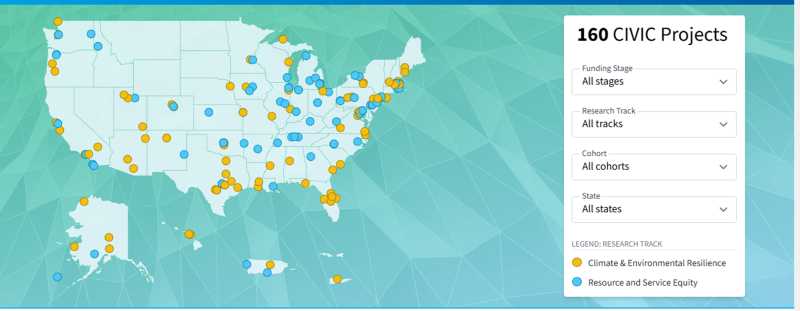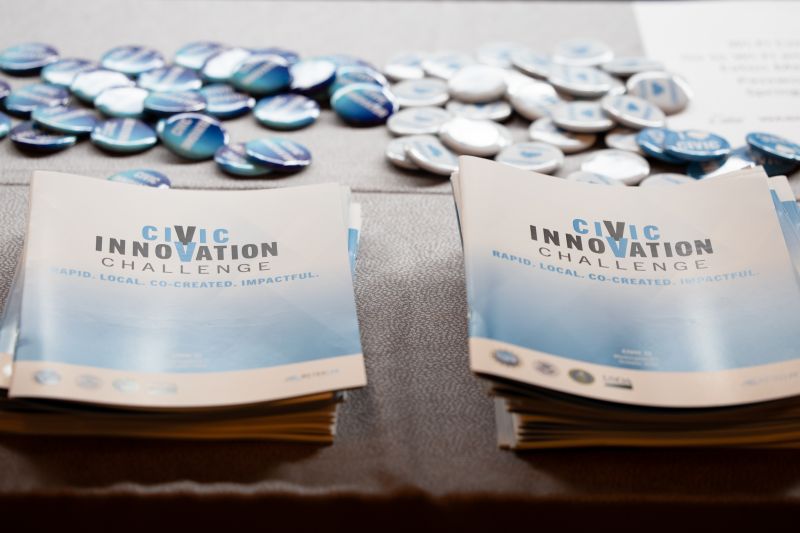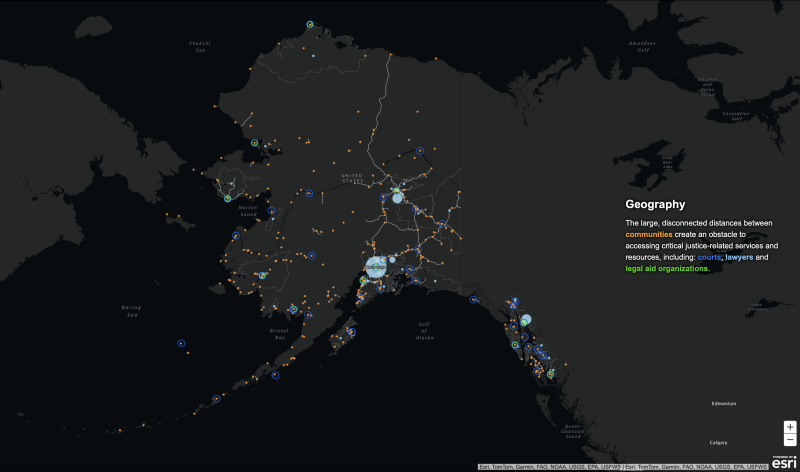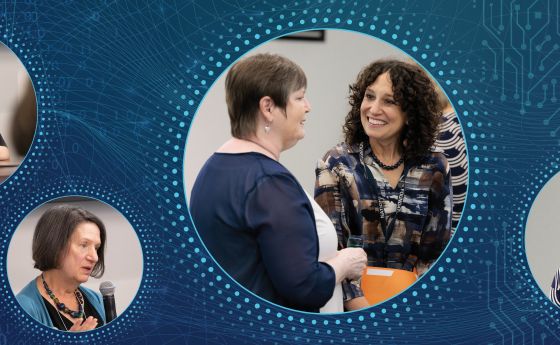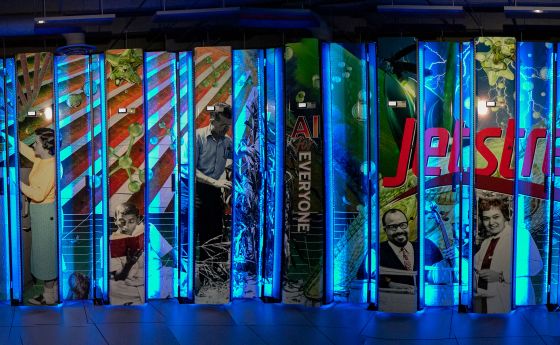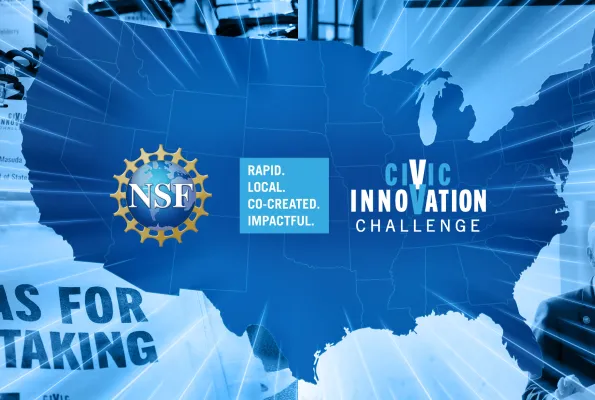
The competition empowering and transforming U.S. communities
In a world where local communities often find themselves grappling with complex societal challenges, the U.S. National Science Foundation has taken a critical step to bridge the gap between scientific and technological innovation and community needs. Fundamental research can take years or decades before discoveries leave the lab, but the NSF Civic Innovation Challenge (NSF CIVIC) program demonstrates that it's possible to accelerate the process of connecting communities with cutting-edge research by fostering collaboration between researchers, local governments and nonprofit organizations.
Community-driven competition
Now in its third round of funding, NSF CIVIC — a partnership with the U.S. Department of Homeland Security’s Science and Technology Directorate, the Department of Energy and the U.S. Department of Agriculture's National Institute of Food and Agriculture — aims to turn research and innovation into real, community-driven solutions. Launched in 2020, NSF CIVIC is designed to support collaborative teams of researchers and community partners who address urgent local challenges. The challenge is structured in two stages: Stage 1 (six months) supports planning and co-design of pilot projects tailored to community needs, while Stage 2 (12 months) provides funding to implement and expand these projects.
The program design and philosophy of CIVIC aligns closely with NSF's mission of promoting the progress of science and advancing national health, prosperity and welfare, especially when it comes to building resilient communities, promoting equity and addressing environmentally related instability and disasters. By funding projects that address these critical issues, CIVIC not only supports NSF's goals and strengthens ties between the scientific community and the public but also contributes to the administration's vision of a more equitable and sustainable future. Highlighted below are just some of the 22 pilot projects in the CIVIC 2.0 cohort already demonstrating a range of tangible impacts in communities across the country.
Using advanced sensing capabilities for community-based resilience challenges
From poor air quality in Utah to stormwater and flooding damage in coastal Maine and Cape Canaveral, Florida, local communities face a variety of stressors that adversely affect community health, safety and prosperity. Communities facing these challenges require new strategies to improve their resilience. Recent advances in sensing and AI modeling have enabled researchers to understand the systems driving these stressors at unprecedented levels of detail, opening the door for active community engagement and citizen science to tackle these challenges.
In Utah, where air quality affected by wildfires and climate inversions can have serious health effects, the advent of affordable, high-tech sensors coupled with advanced artificial intelligence models have allowed researchers from the University of Utah and community partners to monitor local air quality in real time and forecast air quality over the next three days.
In Maine, researchers are employing advanced sensors alongside community volunteers to monitor coastal flooding events and make accurate forecasts, helping increasingly vulnerable coastal communities understand the extent of flooding in real time and improve community response and future development.
Cape Canaveral is installing and testing new, nature-based green stormwater infrastructure within urban areas, such as rain gardens with groundwater sensors, to mitigate flooding and purify stormwater.
Modernizing aging infrastructure and detecting problems before they arise
Many communities struggle with modernizing aging infrastructure, often addressing issues only after critical failures occur. A CIVIC project led by researchers from New York University and their community partner from the archdiocese of New York developed a novel, autonomous robot that employs ground-penetrating radar and lidar technologies to rapidly scan city rooftops to detect water leaks, enabling smaller, more targeted repairs. The research team has scanned dozens of buildings across New York at a fraction of the time and cost of normal inspections and have formed a startup to expand operations.
A CIVIC grant at Penn State is focusing on water damage below ground, where often the first sign of trouble in a community is a burst pipe and serious flooding. Working with the city of Pittsburgh, the team attached acoustic sensors to existing buried fiberoptic lines. Using advanced machine learning algorithms, they can detect water leakage in buried pipes earlier and with better accuracy, allowing the city to fix the infrastructure before a small leak becomes an expensive disaster.
The city of Waco, Texas, is still recovering from the devastating snowstorms that hit the state in 2021 and created widespread power grid outages. The city has pursued local energy security through waste-to-energy plants, but this type of energy generation currently comes with environmental and health costs to residents. Researchers from Baylor University have partnered with the city to pilot a near-zero emission, multi-fuel combustor upgrade to existing "dirty" waste-to-energy combustors. This will allow the city to transform a wide variety of local waste into ultraclean energy with minimal postprocessing, leading to a healthier and more sustainable community.
Reimagining social services with a community focus using science-based approaches.
The CIVIC program also funds inspiring pilot projects that reimagine social services in conjunction with the communities that need them.
In West Philadelphia, communities face the dual pressures of poverty and gentrification, threatening long-term residents. Researchers at Drexel University are helping residents develop a multigenerational housing project that remains affordable for the community and profitable for developers. The research team is testing their arts-centered intergenerational housing model to strengthen the community and allow residents to age in place with dignity. The pilot has already broken ground on new buildings and hopes to provide a model for equitable development across the U.S.
While representation is guaranteed for criminal cases, under-resourced rural infrastructure in Alaska is leaving many low-income residents without access to affordable legal aid for civil trails. A coalition of researchers and state-level legal organizations are exploring a first-of-its-kind Community Justice Worker project to bridge this gap. This project represents a replicable delivery model for legal advocacy in rural communities, including formal legal advice and representation, by training trusted community members to provide said advocacy in their own communities.
In Chicago, many communities struggle to successfully implement "good food" policies that ensure individuals and families have access to nutritious, high-quality food that promotes overall health and well-being. Researchers from Illinois Institute of Technology have teamed up with communities to create better food procurement policies to strengthen the sustainability and resilience of their food supply. The pilot project explored changes to procurement models at larger institutions to help small producers to effectively self-determine their participation in the food supply chain. The lessons here can be adopted by other cities and counties as they adopt their own good food policies.
These are but a handful of the dozens of pilot projects supported by CIVIC that are making a difference in communities nationwide. With over 50 new stage 1 grants launched in October 2024 under CIVIC 3.0, the program is poised to make an even greater impact in addressing critical societal challenges going forward.

